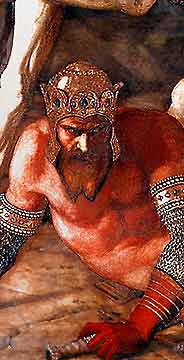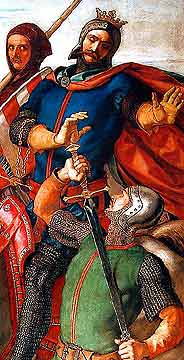Generosity - King Arthur unhorsed spared by Sir Launcelot
© 2007
Armchair Travel Co. Ltd. - This page may be used for non-commercial purposes
ONLY!
![]()

[ Play
Narrated and Animated Movie ! ] An episode from near the end of Morte d'Arthur is included to exemplify knightly Generosity. After Arthur learned that Guenever and Launcelot were lovers, he made war against Launcelot's castle of Joyous Guard. In a battle Arthur was thrown from his horse by Sir Bors, Launcelot's kinsman. Here we see the King lying at the feet of Sir Bors, at the mercy of this knight.
And so Sir Bors drew his sword and said to Sir Launcelot: 'Shall I make an end of this war?' and that he meant to have slain king Arthur. 'Not so hardy,' said Sir Launcelot, 'For I will never see that most noble king, that made me knight, neither slain nor shamed.' And therewithal Sir Launcelot alighted off his horse, and took up the king, and horsed him again, and said:
'My lord Arthur, for God's love stint this strife.' Then when king Arthur was on horseback he looked on Sir Launcelot, and the tears burst from his eyes, thinking on the great courtesy that was in Sir Launcelot, more than in any other man.'
But the king's jealous enmity could not be so easily stilled, and this was the beginning of the end of the Round Table.
The five frescoes in the Robing Room represent the chief virtues of Chivalry: Courtesy, Mercy, Religion, Generosity and Hospitality. Dyce was actually commissioned to produce seven frescoes and seven friezes in the room, for the sum of £800 per year. The Arthurian tales - chiefly in the 15th-century version by Sir Thomas Malory - had long been recognised as a founding heroic myth of the British nation and as such, were felt to have an important place in the decoration of the new Palace of Westminster.
The actual historical period to which Arthur would have belonged is from late-fifth to early sixth centuries AD - that is, around 475 to 511 or 539 AD - and he and his so-called 'knights' would probably have worn arms and clothes of the late Roman Empire.
However, the tales have come down to us in medieval guise, largely through the version by the 15th-century Sir Thomas Malory, and even today, when we really know better, we see Arthur and his knights in full medieval dress: chain mail, helmets, saddles and stirrups (the last of which had yet to appear in Arthur's day) .
Dyce shows several figures wearing chain mail. It is unlikely that such armour was known in the time of the historical Arthur; but since chain mail is the earliest form of armour in these islands, the decision was taken to depict the Arthurian knights as wearing it. But Dyce complained bitterly about the time it took to paint it - he claimed it seriously delayed the completion of the work.
Progress was in any case painfully slow, and on the 30th of May 1854 Dyce asked to be granted 'exclusive possession' of the Robing Room. The request was passed on by the Secretary of the Fine Arts Commission to the Queen:
The Commissioners humbly pray that Her Majesty will be pleased, on the occasion of the Opening or Prorogation of Parliament, to give up the use of the Robing Room.
The Queen consented, and for the next few years the Robing Room became, effectively, Dyce's studio - in fact he gave it as his address. But during these years he took more and more outside work, and little progress was made on these frescoes.
Another cause of delay was the fact that he could only paint in the summer, since the frescoes (being painted directly onto wet plaster) took much too long to dry during the winter months.
[ Virtual
Tour ] [ Main Topics
Index ]
- Malory

Additional Information on
Generosity - King Arthur unhorsed spared by Sir Launcelot
- Sir Charles Eastlake
Explore-Parliament.net: Advanced Category Search
Keyword Categories:
_Topic_Arthur_Legend
_Event_Literary
_Object_Painting
_Object_Artwork
_Artist_Dyce
_Generosity